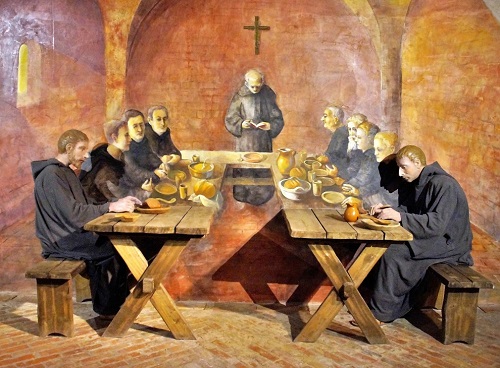
“If a man does not work, neither shall he eat,” wrote the Apostle Paul in the New Testament. But what if your vocation demands that you own nothing and spend much of your time in contemplation of ethereal mysteries?
In time, even religious orders intended to live as mendicants (beggars) allowed some system of ownership. Occasionally, without any profit motive, monasteries acquired not insignificant fortunes. Some also engaged in enterprise – offering products they created on the open market.
“In the context of Christian religious orders we find this striking fact: a person cannot completely remove himself from commerce, even for the most devout religious reasons,” writes Lindsey Wilbur in a new essay for Religion & Liberty Transatlantic.
Wilbur, a former intern at the Acton Institute who works with the institute’s Rome office, Istituto Acton, traces this fascinating history from the mendicant orders (e.g., the Dominicans) to the modern day in her essay, titled “Even monks have to eat: Enterprise meets the vow of poverty.” The monks’ need for food, water, and shelter had unexpected results:
This has led to monasteries accumulating wealth and engaging in commerce to support themselves and (more importantly from their point of view) to fund their outreach to the poor. In his annual Acton University lecture titled “Markets and Monasticism,” Dylan Pahman provides research that demonstrates the wide variety of commerce – and wealth accumulation – among Eastern Orthodox monks – while tea, beer, and religious articles are just a few examples of products made for purchase by Roman Catholic communities. …
Our Sunday Visitor describes purchasing such products as way “to partake in the fruit of monks’ and nuns’ labors.” This exchange helps all parties involved. Through commerce, Pahman says, monasteries found that they “need the world and the world needs them, too.”
Wilbur also describes a religious community, known to her, in which the superior has empowered individual members to manage money for themselves.
The results proved transformative. Upon adapting this system, one member of the community noticed that she was more efficient with her spending since she could forecast upcoming expenses, and that she had greater awareness of how much money she spent. … [The new system] brought with it empowerment and privacy…
“We grew as a community,” observed one member. … [M]aking decisions together connected the women on yet another personal level. Since each member had a voice, they came to value the unique voices of each other member, an expression of each person’s inalienable value and worth. These developments shed light on how respect for human dignity drives the human tendency toward liberty – and vice-versa.
Her fascinating overview and case study show that even those least motivated by greed thrive and flourish thanks to enterprise. Commerce not only supplied their earthly needs but helped advance their monastic vocation, deepening their bonds of divine charity.
You can read her full essay here.
(Photo credit: Public domain.)

